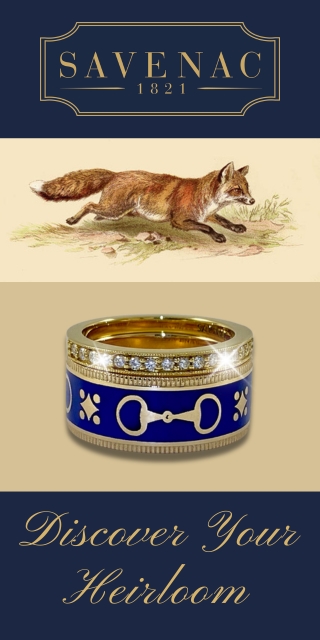April 29, 2016
The Cad, Part I
Martha wrote this story after studying The Life of an American Sportsman: Being Reminiscences by Harry Worcester Smith during the course of her 2016 John H. Daniels Fellowship at the National Sporting Library & Museum in Middleburg, Virginia.
Harry Worcester Smith at his writing desk, possibly in Aiken, SC or Grafton, MA / Courtesy of NSL&M
I’m not sure that many people would have characterized Harry Worcester Smith as a good-for-nothing “cad.” On the other hand, neither might they have called him a gentleman. He was highly opinionated and he had a temper. He had a wicked sense of humor and he suffered no fool. He was a scalawag, a bit of a braggart, maybe a knave, possibly a scoundrel. It’s perhaps divine providence or poetic justice that his favorite horse, his horse-of-a-lifetime, was named “The Cad.”
Colour
We see every color of horse in the hunting field. And while foxhunters really shouldn’t care about color, I’m guessing that many riders have a preference. Right or wrong, I know I do. In this photo, several horses of varying colors are crossing the country well. We may be missing more colors than we care to, but we hope you’ll get the idea.
Keeping up with the Blue Ridge hounds in Virginia are (L–R) Cyrus (a paint) owned and ridden by Karel Wennink; Guitar (a “black-pointed bay”) owned and ridden by your editor; Hot Rize (a “black-pointed bay” and winner of the 2014 Virginia Gold Cup) owned and ridden by Russell Haynes; and Very Berry (a roan) owned and ridden by Jef Murdock, MFH, Old Chatham Hunt (NY). / Nancy Kleck photo
Colour by Edric G. Roberts
The old saying, so often repeated,
That ‘there never was yet a good horse
Of a really bad colour,’ is greeted
With a shrug, as a matter of course;
To the past it is now relegated
As the lore of some old-fashioned school,
Which believed in tradition that rated
An exception as proof to the rule.
RSPCA Intrusions Reach a New Low in England
Police Chiefs in the UK have called for an end to prosecutions of animal abuse cases by the Royal Society for the Prevention of Cruelty to Animals (RSPCA). Recently, some RSPCA employees with extreme views on animal rights have brought the once reputable organization to a new low. Employees of the society took the Byrnes Family cat without legal authority to do so. They put the cat down, prosecuted the family for animal abuse, but the evidence presented was insufficient to convince the court. The Byrnes Family won their case, but lost their cat. The children never had a chance to say goodbye to their pet. Foxhunting Life has reported on prosecutions of foxhunts brought by the RSPCA. The society brings to the courts eighty percent of all prosecutions under the Hunting Act, spends enormous amounts of donors’ monies to prosecute the cases, and loses seventy-eight percent of the prosecutions due to insufficient evidence. In 2013 the RSPCA was estimated to have spent at least a half million pounds of charitable funds on prosecutions against hunts. The charity was criticized by judges of the court after spending more than three hundred thousand pounds prosecuting the Heythrop hunt. Income from donations to the RSPCA have since cratered by seven million pounds in one year, prompting the charity to cut jobs and restructure. According to The Telegraph, the National Police Chiefs Council (NPCC) says: “For some considerable time the RSPCA have assumed the default role of prosecutor for offences under the Act and have done so outside of a statutory framework with no powers. “Their long standing good work and expertise in this area should of course be recognised but it ought to be right that the primary enforcer with responsibility for this area should be a single agency, preferably a statutory body funded by Government. “With this would come greater governance and accountability along with a right to review prosecution decisions in with all other criminal offences.” Simon Hart, a Tory member of the committee and former chief executive of the pro-hunting Countryside Alliance, is reported as saying, “There is increasing recognition that trying to be a political movement, tireless fund raiser and voracious prosecutor has resulted in a conflict that we would not accept in any other walk of life. “There are numerous examples of other countries and wild life charities that do good work, but who rely on the police and criminal justice system to implement the law. “If the RSPCA were to hand over its prosecuting role to the police and CPS it would begin to repair its tattered reputation.” The RSPCA continues to argue against the NPCC recommendations. Click for more. Posted April 30, 2016
Read More

















